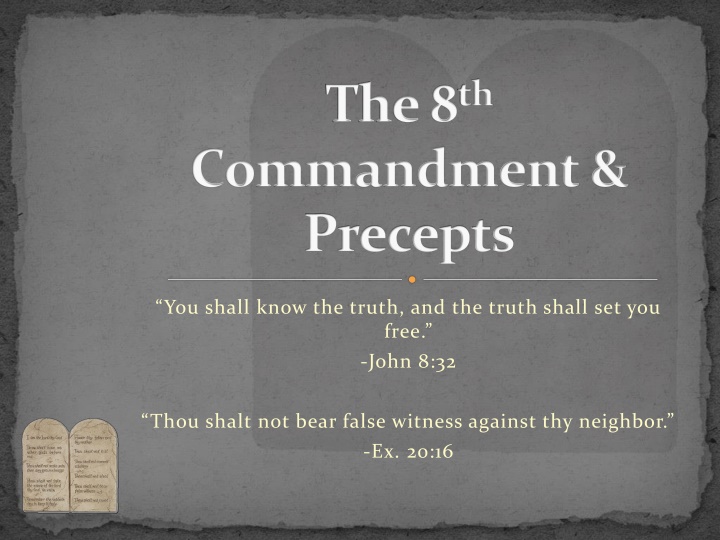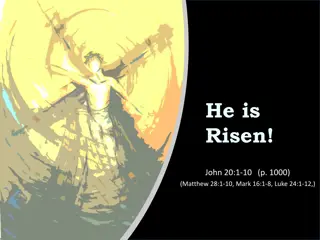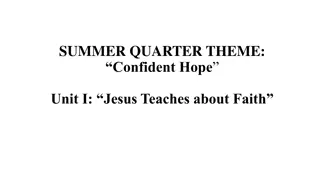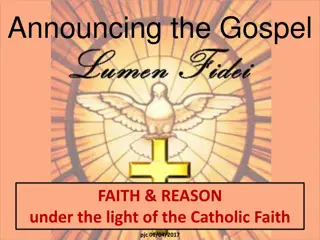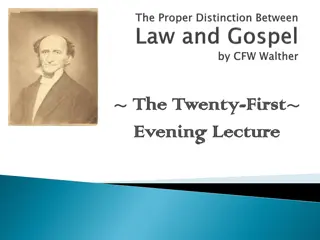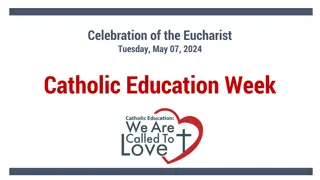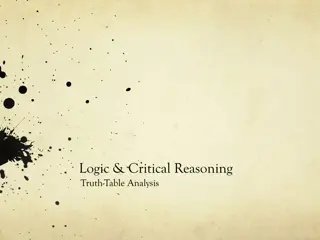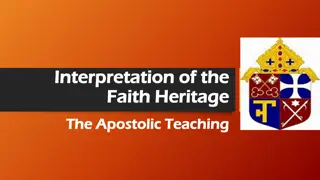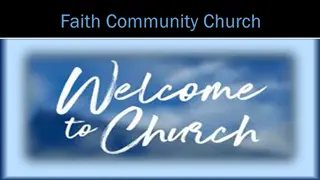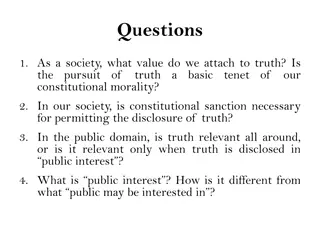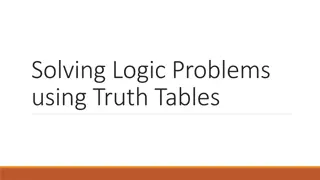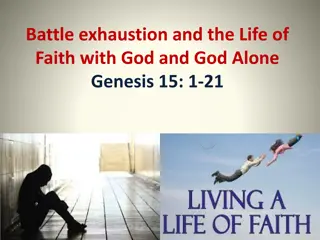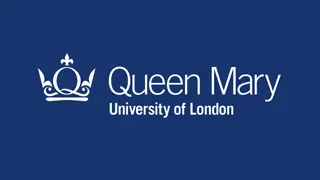The Importance of Truth in Life and Faith
The significance of truth, as reflected in the 8th Commandment and precepts, emphasizes the relationship between truthfulness and divine principles. From understanding what truth entails to witnessing to truth in life, this content delves into the essence of truth as a guiding virtue in both personal conduct and faith-based actions.
Download Presentation

Please find below an Image/Link to download the presentation.
The content on the website is provided AS IS for your information and personal use only. It may not be sold, licensed, or shared on other websites without obtaining consent from the author.If you encounter any issues during the download, it is possible that the publisher has removed the file from their server.
You are allowed to download the files provided on this website for personal or commercial use, subject to the condition that they are used lawfully. All files are the property of their respective owners.
The content on the website is provided AS IS for your information and personal use only. It may not be sold, licensed, or shared on other websites without obtaining consent from the author.
E N D
Presentation Transcript
The 8th Commandment & Precepts You shall know the truth, and the truth shall set you free. -John 8:32 Thou shalt not bear false witness against thy neighbor. -Ex. 20:16
The God Who is Truth The eighth commandment forbids misrepresenting the truth to others. This commandment flows from our basic vocation to bear witness to the God Who is Truth. Therefore, any undermining of the truth is an undermining of God s covenantal relationship with man and is an offense against the holiness of God, Who can neither deceive nor be deceived (Vatican I, Dei Filius). In Jesus Christ is revealed the fullness of truth, for He is the one who is full of grace and truth (John 1:14). It is through the truth that the Holy Spirit sanctifies the Christian, for the truth is not just informative but transformative, because the Truth is a Person.
What is truth? Truth is a statement that corresponds to reality. Thus, if the sky is blue, and we say, The sky is blue, this statement is said to be true because it corresponds to what actually is. Traditional Catholic teaching holds that telling the truth means speaking in conformity with the mind; i.e., that what you say accords with what you are thinking. Furthermore, that the words or manner of speaking that you use conveys the same idea in the mind of the receiver as is in your mind
What is truth? Truth as uprightness in human action and speech is called truthfulness, sincerity, or candor. Truth or truthfulness is the virtue which consists in showing oneself true in deeds and truthful in words, and in guarding against duplicity, dissimulation, and hypocrisy. -CCC 2468
Bearing Witness to Truth In the life of the Christian, the duty to bear witness to the truth is connected with Christ s mandate to preach the truth to all men. In situations that require witness to the faith, Christians must profess it without equivocation, after the example of St. Paul before his judges (CCC 2471). Martyrdom is the supreme witness to the truth and is a bearing witness even unto death. By his death, the martyr bears witness to Christ, to the truth of the faith and the doctrine of the Church. All people have a natural right to life and an obligation to defend their life if need be, but the calling to bear witness to the truth of the faith is higher, and thus when the faith is in question, it is better to die than to deny its veracity.
Offenses Against Truth False witness is a statement contrary to the truth told in court. If it is done under oath, it becomes perjury. Lies told in public take on a particular gravity, and both are mortal sins, especially when they harm an innocent person. Rash judgment is the assumption as true, without sufficient foundation, of the moral faults of another. Detraction occurs when one, without good reason, discloses another s faults and failings to a person who does not need to know them. Calumny is the damaging of another s reputation by false statements made against them.
Offenses Against Truth Flattery, adulation or complaisance are forbidden and become grave when they confirm another in wicked deeds. They are venial sins if they only seek to be agreeable or to avoid evil. Boasting or bragging is an offense against truth, as are irony and sarcasm aimed at disparaging someone by maliciously caricaturing some aspect of his behavior. Many of these offenses have to do with destroying the reputation and honor of one s neighbor. Honor is the social witness given to human dignity. Everybody enjoys a natural right to the honor of his name and reputation and to respect. Destroying them offends the virtues of justice and charity.
The Lie Lying is the most fundamental way of sinning against the truth. St. Thomas Aquinas adds to this that a lie is a statement at variance with the mind. Jesus denounces lying as a work of the devil: [Satan] was a murderer from the beginning, and has nothing to do with the truth, because there is no truth in him for he is a liar and the father of lies (John 8:44).
The Gravity of a Lie The gravity of a lie depends on several factors: the nature of the truth deformed, the circumstances, the intent of the one lying, the harm suffered by the victims. A lie is always a mortal sin when it does injury to another.
Three Degrees or Types of Lies Injurious or hurtful lies- an injurious lie is one told for the purpose of bringing harm to another and is the most serious type of lie. Officious lies- an officious, or white, lie is such that it does nobody any injury: it is a lie of excuse, or a lie told to benefit somebody. However, it is a venial sin and ought to be avoided, as it engenders in the one who does it a disregard for truth and can lead to injurious lies. Jocose lies- jocose lies are told for the purpose of affording amusement and are not lies in the true sense of the word; of course what is said merely and obviously in joke cannot be a lie. An example of a jocose lie is using a deception to get somebody to come to a certain place for their surprise birthday party.
Lying Since it violates the virtue of truthfulness, a lie does real violence to another. It affects his ability to know, which is a condition of every judgment and decision. It contains the seed of discord and all consequent evils. Lying is destructive of society; it undermines trust among men and tears apart the fabric of social relationships (CCC2486). Every offense against truth carries with it the duty to make reparation, even if its author has already been forgiven.
Is it ever permissible to lie? First and foremost, lying is always wrong, the only difference being whether the lie constitutes a mortal or venial sin. However, in situations where communication of the truth is not desirable or would even be dangerous, there are several ways a person can get around the moral dilemma. It should be pointed out that none of these methods are to be used without serious reason.
When the Truth is not Desirable Guarded Speech refers to language that has a commonly accepted meaning contrary to the literal meaning of the words. Thus, when a secretary tells a caller that her boss is away from his desk, the caller understands that this is a term that conventionally means that the boss is unavailable, whether or not he is literally away from his desk. Circumlocution is a method whereby the speaker, while feinting as though answering the question, actually avoids the question altogether and shifts the emphasis of the conversation to another topic. For example, a policeman says, Were you speeding back there? And you reply, What? Me, speeding? C mon officer! You think I d speed? Notice how you give the impression of giving an answer when in reality none has been given. Circumlocution is not permissible without serious reason.
When the Truth is not Desirable Equivocation, also called Mental Reservation, is a controversial method whereby the speaker makes a statement that can be interpreted as the truth, but can also be taken in another sense; It is an intentional ambiguity spoken with the purpose of deceiving someone else. There are two kinds of mental reservation, one allowable, one not: Broad Mental Reservation: the true meaning of the words is actually discernible to someone who applies careful scrutiny to the statement. Strict Mental Reservation: this means that nobody but the speaker could possibly discern the true meaning of the statement.
Respect for the Truth The right to communicate the truth to another is not unconditional but must be subordinated to fraternal love and charity. This means that we must use prudence to determine whether or not it is appropriate to reveal the truth to somebody who asks for it (CCC 2488). Charity, as well as a respect for the truth, ought to dictate the response to every request for information or communication.
Secrets The secrecy of the Sacrament of Confession is sacred and cannot be broken under any pretext whatsoever. Canon 983 1 of the Code of Canon Law states it is a crime for a confessor in any way to betray a penitent by word or in any other manner for any other reason. Professional secrets (those of political office holders, soldiers, physicians, lawyers) or other confidential information must be kept secret, save in exceptional cases where keeping the secret would cause grave harm, and where the harm can only be avoided by divulging the secret. Interference by the media in the private lives of persons is to be condemned to the extent that it infringes upon their privacy and freedom.
Truth, Beauty & Sacred Art Goodness is accompanied by spiritual joy and moral beauty. The truth is beautiful in itself. Truth can find other expressions in humanity besides in words. Sacred art is true and beautiful when its form corresponds to its particular vocation: evoking and glorifying, in faith and adoration, the transcendent mystery of God ..." .... For this reason bishops, personally or through delegates, should see to the promotion of sacred art, old and new, in all its forms and, with the same religious care, remove from the liturgy and from places of worship everything which is not in conformity with the truth of faith and the authentic beauty of sacred art. -CCC 2502-2503
The Precepts of the Church The First Precept: You shall attend Mass on Sundays and holy days of obligation (This is called the Sunday obligation. It can be fulfilled on the vigil Mass of the Saturday the night before, but Sunday remains the normative day for Catholic worship. If you are late to Mass, the obligation is considered fulfilled so long as you make it before the Eucharistic liturgy. The Second Precept: You shall confess your sins at least once a year This was mandated by Lateran IV in 1215 and was traditionally done during Lent in preparation for Easter. Once a year is a bare minimum; if you want to have any sort of regular sacramental life, you ought to consider making confession at least monthly. John Paul II and Benedict XVI have both recommended it weekly.
The Precepts of the Church The Third Precept: You shall humbly receive your Creator in Holy Communion at least during the Easter Season Guarantees at least a minimal reception of the Lord s Body and Blood in conjunction with the highest Holy Day of the Church s liturgical year and conforms to the words of Christ in John 6:53: Unless you eat the flesh of the Son of Man and drink His blood, you have no life in you . The Fourth Precept: You shall observe the days of fasting and abstinence established by the Church It is meant to ensure a proper period of ascesis and penance in preparation for the liturgical feasts. They help us master our instincts and attain freedom of heart. The Fifth Precept: You shall help provide for the needs of the Church The faithful are obliged to assist in meeting the material needs of the Church insofar as they are able.
Lesson content courtesy of www.unamsanctamcatholicam.com Power Points prepared by Catholic Presentations
